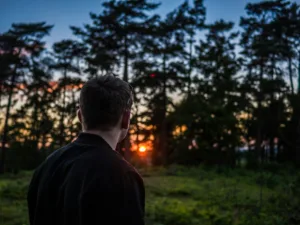Men’s Health and CSA Survivor Recovery
Child sex abuse can be a difficult experience to process and discuss with anyone. This is particularly true, for men. Simply those four words; male, childhood, sexual, abuse, can be difficult for most men to discuss. Sharing a Childhood Sexual Abuse (CSA) survivor story of childhood sexual abuse goes against the grain of what society teaches men to believe about men’s health and “being a man.”
Along the same lines as “being a man,” there is a lot of confusion about the myths and facts about men and CSA. If left unexamined and uncorrected, these false notions can become an obstacle to healing.
Lack of Discussion
The lack of discussion of male childhood sexual abuse can lead to consequences that can include self-destructive behaviors, depression, addiction, complex trauma, tumultuous relationships, anger, and addiction. However, discussion can pave the way toward understanding. Someone to say things like, “how are you feeling”?, “I’m sorry this happened to you,” and “you’re not alone, I’m here for you,” makes it possible for you to start to understand what happened and what is happening to you.
Myths and Facts of Male Childhood Sexual Abuse
If there is no discussion, the myths about male childhood sexual abuse can take over and make living with the memory of it worse. Here are some of the false understandings and true facts to consider that may show up in the thinking that prevents discussion.
| Myth | Fact |
| Sexually abused means he is less masculine or “not a real man.” | Boys and men can be sexually abused and it has nothing to do with how masculine they are. |
| Getting aroused, or liking the attention, during the abuse means he wanted and liked it. | Getting aroused, or liking the attention does not mean in any way that he liked being manipulated or abused. The fact is male genitals have 20,000 nerve endings. So, when the privates are stimulated, they will get aroused. This does not mean that they liked it. No part of male childhood sexual abuse is or was his responsibility or fault. |
| Because of the abuser’s sexual orientation, it was expected. | Abusive behavior takes advantage of the child’s vulnerability and is in no way related to the sexual orientation of the abusive person. |
| He liked it because he felt like he was getting “lucky.” | Girls and women can sexually abuse or assault boys and men. The boys and men are not “lucky” but exploited and harmed. |
So long as societies and individuals believe these false myths about male childhood sexual abuse, men and boys will continue to have barriers to getting effective treatment.
Men Hide Their Childhood Sexual Abuse
A very common concern adult CSA survivors have is that they feel that sexual abuse may affect their sexual orientation. Guys fear that the CSA means they are weak or can’t stand up for themselves. They often fear how their loved ones might react if they found out about the abuse. For these reasons, many men chose to never, ever tell. They keep their secret locked away from the world (and sometimes to themselves). Eventually, over time as the man becomes an adult, the shame related to the CSA becomes overwhelming. Depression, anxiety, addictions, anger and acting out start to emerge.
Due to the myths of CSA and masculinity, it makes sense why men have the urge to not tell. However, we know that coming forward by telling a spouse, a significant person in his life or a trained therapist can be a powerful healing experience. He can discover more about himself in sharing and healing in the process.
It’s important to remember that the feelings of shame often lead people to hide their experience because they don’t want anyone thinking they are “bad.” However, when sharing with a trusted person the disclosure starts to lift the shame. The weight of shame often starts to reside because there is no longer a secret. The healthy and supportive response from the trusted significant person can be a powerful reparative experience; the disclosure shows the survivor that they are good, worthy, strong and not responsible.
Many boys who have been sexually abused suffered physical harm, and continue to experience disbelief from adults who could listen and provide support. Societal beliefs, however, force a reluctance, and refusal to acknowledge what happened specifically because of the harm it caused. This increases shame felt by boys and men and leads many to feel that they have to “tough it out” on their own. This makes it harder to seek help.
CSA Survivor 1 in 6
It is difficult to believe, but there is strong scientific evidence to show that at least one in six men have been sexually abused or assaulted by the age of eighteen.
It helps to know that the sexual abuse term used by researchers describes experiences in which children are subjected and compelled by another person, often of large age difference into unwanted sexual contact. This experience often involves threats, force, and exploitation of power and authority. This weaves it into the very fabric of male childhood.
Studies in persons across the US from 1990 to 2005 and by phone and mail reveal that more detailed questions uncover a higher percentage, around 18 percent of respondents who say they’ve been sexually abused. Short surveys return lower percentages, around 12 percent. These numbers all fall in the 1 in 6.
Males who have these experiences are less likely to disclose them than are females. Researchers additionally find that men with childhood sexual abuse are at a higher risk for many male health disorders. These include problems in intimate relationships, underachievement at school and work, symptoms of post traumatic stress disorder, depression, alcoholism, drug abuse, and suicidal thoughts and attempts.
Men’s Health and Recovering as a CSA Survivor
The 1 in 6 statistic, based on scientific evidence, is likely an underestimate of the prevalence of CSA Survivors. Finding others to talk to about childhood sexual abuse as a male can be difficult. But the process helps to build a healing momentum where you can walk without shame in a new freedom.
If you are having trouble finding a way to connect with others, remember that you are not alone. Seek out a trained therapist to meet and interview to see if this person is a fit for your particular situation and therapy needs. If you feel you can talk with a therapist after you have an initial meeting, it is time to set up some more time to uncover what you can do to re-open what is yours and discover a new life.





